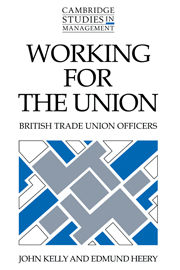Book contents
- Frontmatter
- Contents
- List of figures and tables
- Preface
- List of abbreviations
- Part 1 Introduction
- Part 2 The parameters of union work
- 3 Full-time officer organization
- 4 Employment relations
- 5 Work relations
- Part 3 The full-time officer at work
- Part 4 Conclusions
- Appendix: Research methods
- Notes
- Bibliography
- Index of names
- Index of subjects
- Cambridge Studies in Management
4 - Employment relations
Published online by Cambridge University Press: 22 October 2009
- Frontmatter
- Contents
- List of figures and tables
- Preface
- List of abbreviations
- Part 1 Introduction
- Part 2 The parameters of union work
- 3 Full-time officer organization
- 4 Employment relations
- 5 Work relations
- Part 3 The full-time officer at work
- Part 4 Conclusions
- Appendix: Research methods
- Notes
- Bibliography
- Index of names
- Index of subjects
- Cambridge Studies in Management
Summary
The purpose of this chapter is to describe, analyze and account for the employment relationship experienced by full-time officers. Accordingly, it reviews recruitment and selection practices, training and development, career opportunities and rewards and employment termination for officers employed by British unions. It also contains information on the personal characteristics of officers who are recruited through and experience these practices. The primary reason for this examination is that the literature on trade unions is replete with claims that officers acquire and advance their distinctive interests as representatives through their employment relationship. For example, within the Marxist tradition the alleged conservatism of officers and their unresponsiveness to members has been related to several features of their employment relationship: appointment, rather than election to office, relatively generous salaries and benefits, considerably in excess of those of their members, and training and socialization in the norms of ‘good industrial relations practice’ (see Kelly, 1988: 161–78). Employment relations may also condition officer interests and behaviour indirectly, by facilitating the selection of officers with particular characteristics. The neglect of ‘equality bargaining’ by British unions, for instance, has been related to the absence of women from officer positions, which in turn has been related to methods of recruitment and the absence of equal opportunities policies within unions (Colling and Dickens, 1989: 29–31). Given arguments of this kind, therefore, it was considered necessary to examine the employment relations and characteristics of officers before turning to an examination of how they actually discharge their role.
Selection
The view that the employment relation of officers determines their behaviour in the job is encountered most forcefully in the debate over methods of officer selection.
- Type
- Chapter
- Information
- Working for the UnionBritish Trade Union Officers, pp. 53 - 73Publisher: Cambridge University PressPrint publication year: 1994



